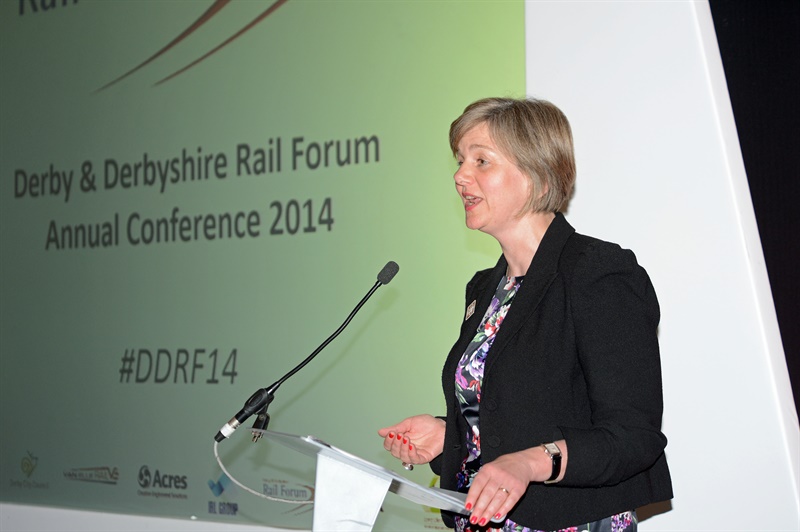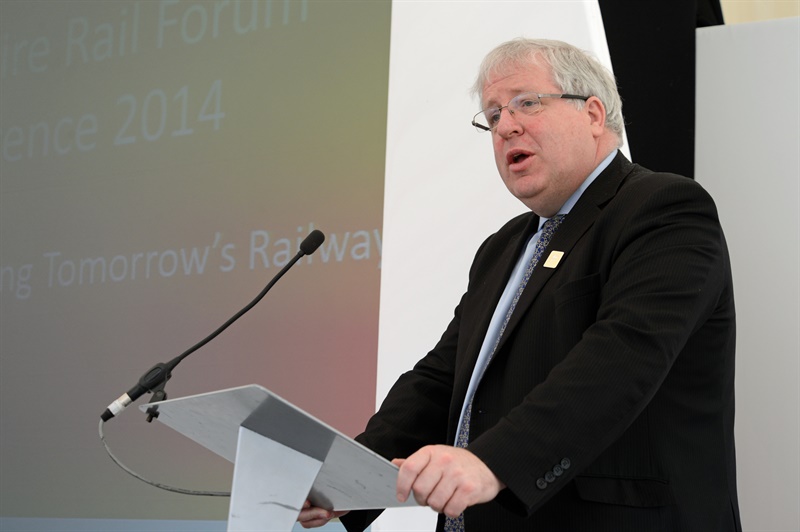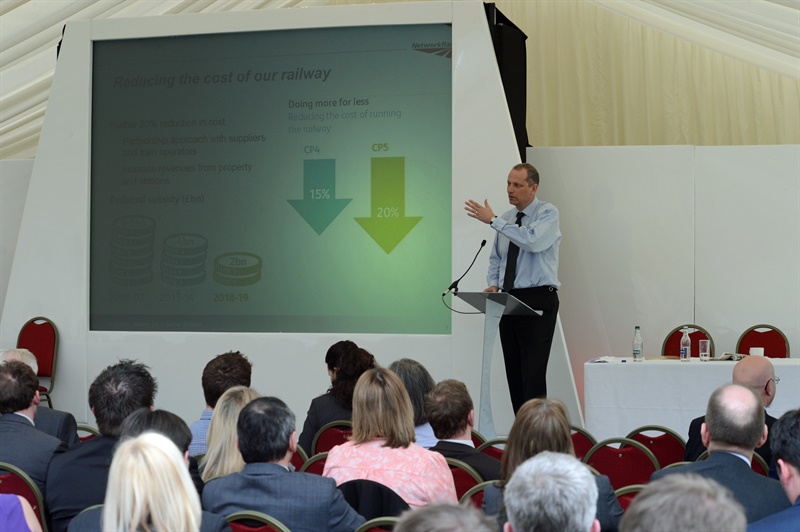Leading figures from across the industry addressed ‘the challenge of CP5’ at the Derby & Derbyshire Rail Forum annual conference, while Network Rail finance director Patrick Butcher revealed more about the ongoing changes at the company.
Butcher was joined by other key leaders including transport secretary Patrick McLoughlin; the DfT’s director general of the new Rail Executive, Clare Moriarty; Stagecoach chief executive and Rail Delivery Group (RDG) chairman Martin Griffiths; RDG director general Michael Roberts; Rail Freight Group executive director Maggie Simpson; and Carillion’s Paul Paddick.
The conference was preceded by a dinner held the night before and addressed by shadow transport minister Lilian Greenwood MP, who was supportive of HS2 in her speech.

HS2 was also a big part of McLoughlin’s speech, as it has been at most of his public events since taking up his post 18 months ago. He also said there was “tangible evidence” that his government’s growth policies had helped the rail supply chain in Derby, and discussed training and skills in the rail industry.

Moriarty explained more about the changes at the DfT, the formation of the Rail Executive and the new people running franchising, but explained that it is currently relying for 50% of its 100-120 staff on limited-term contracts and secondments from the wider industry. She said a managing director is currently soon to be recruited for the new Office of Rail Passenger Services (ORPS) at the DfT, to be launched in the autumn to handle franchise management.
Many of the speakers discussed the £38bn investment programme for CP5 in renewals, maintenance, enhancements and upgrades, as covered in detail previously in RTM.
Patrick Butcher also gave more details about the upcoming changes to site supervision, in which site safety and project supervision will be rolled into one post. RTM has covered these changes before, but Butcher confirmed the changes are coming in towards the end of this year. As Steve Hooker and Simon Kirby have noted in RTM, the current structure can mean situations where there is “someone from potentially the second or third tier running safety…Are they really going to feel accountable to stop the job when the person they’re trying to stop will decide whether they’ve got a job again next week?”
Butcher focused on the absolute commitment to safety, and the fact that the railways remain far behind oil and gas – in other ways a comparable industry – when it comes to workforce safety. He said Network Rail managed to close more level crossings than it expected during CP4, adding: “The only safe level crossing is a closed level crossing.” He revealed that he keeps a photo in his office of 14-year-old Olivia Bazlinton, who died in 2005 at Elsenham level crossing in Essex, as a constant reminder of the human consequences of safety failures.
Talking about some of the individual projects that for CP5, he said that Great Western electrification “is the biggest and most complex thing we’ve done…it makes the West Coast Main Line look like a relatively straightforward line upgrade”.
Timetables will also need completely re-doing, he added, particularly Southern. The current timetables “don’t work” he said, and are impossible to fulfil.
Maggie Simpson of the Rail Freight Group described the trends in freight movements – movements of coal, construction-related goods and Network Rail’s own materials are up, while intermodal freight dropped slightly year-on-year for a variety of reasons. Delays caused by Network Rail have been above the benchmark for almost all of CP4, she added, which isn’t good enough, and she said the freight industry will rise to the challenge set by the HS2 Growth Taskforce of explaining how it will make best use of the classic network capacity freed up by HS2.
Paddick discussed Carillion’s work and the challenges of Midland Main Line electrification, while Griffiths (below) gave a more lighthearted speech, in which he did note that the Network Rail alliance with Stagecoach’s South West Trains franchise had achieved some real successes, though had failures and things to learn from too. He said the industry had to be confident and sell itself as a success story, which it truly has been over the last 20 years. He picked that time period – it has been two decades since privatisation – deliberately, praising the achievements of private train operators, saying the unions’ constant talk of vast profits and under-investment were “myths”, and adding: “Those who seek change purely for ideological reasons need to be careful what they wish for.”
The speakers all praised Derby’s status as a railway hub, and many attendees wore ‘Derby 175’ badges, marking the campaign and year of events being held to celebrate Derby’s 175 years as a railway city.
But it also looks to the future and the coming decades, with McLoughlin noting that Bombardier’s success in winning the Crossrail rolling stock procurement contract “in open competition” will benefit the city and the railway supply chain within it for years to come.
After the event, Colin Walton, DDRF chair said: “We thank the Secretary of State, Clare Moriarty and other leaders of our industry for taking the time to come to Derby to celebrate our future. As the world’s largest cluster of rail businesses we have much to contribute to tomorrow’s railway, both at home and abroad. A contribution that was acknowledged by speakers from DfT, Network Rail, the Rail Delivery Group, Rail Freight Group and private sector operators.”
“The DDRF rail supply chain is up for the challenge – our message is: We are open for business – how can we do business with you?”
Article courtesy of Rail Technology Magazine.
All images copyright Paul Bigland, courtesy DDRF.

